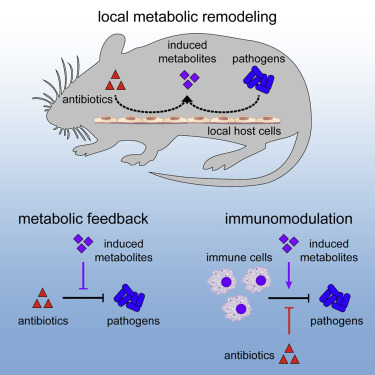Cell Host & Microbe ( IF 20.6 ) Pub Date : 2017-11-30 , DOI: 10.1016/j.chom.2017.10.020 Jason H Yang 1 , Prerna Bhargava 1 , Douglas McCloskey 2 , Ning Mao 3 , Bernhard O Palsson 2 , James J Collins 4

|
Bactericidal antibiotics alter microbial metabolism as part of their lethality and can damage mitochondria in mammalian cells. In addition, antibiotic susceptibility is sensitive to extracellular metabolites, but it remains unknown whether metabolites present at an infection site can affect either treatment efficacy or immune function. Here, we quantify local metabolic changes in the host microenvironment following antibiotic treatment for a peritoneal Escherichia coli infection. Antibiotic treatment elicits microbiome-independent changes in local metabolites, but not those distal to the infection site, by acting directly on host cells. The metabolites induced during treatment, such as AMP, reduce antibiotic efficacy and enhance phagocytic killing. Moreover, antibiotic treatment impairs immune function by inhibiting respiratory activity in immune cells. Collectively, these results highlight the immunomodulatory potential of antibiotics and reveal the local metabolic microenvironment to be an important determinant of infection resolution.
中文翻译:

抗生素引起的宿主代谢环境变化会抑制药物疗效并改变免疫功能
杀菌抗生素改变微生物代谢作为其致死性的一部分,并可能损害哺乳动物细胞中的线粒体。此外,抗生素敏感性对细胞外代谢物敏感,但尚不清楚感染部位存在的代谢物是否会影响治疗效果或免疫功能。在这里,我们量化了腹膜大肠杆菌感染抗生素治疗后宿主微环境的局部代谢变化。抗生素治疗通过直接作用于宿主细胞,引起局部代谢物的微生物组独立变化,但不会影响感染部位远端的代谢物。治疗期间诱导的代谢物(例如 AMP)会降低抗生素功效并增强吞噬细胞杀伤作用。此外,抗生素治疗会抑制免疫细胞的呼吸活动,从而损害免疫功能。总的来说,这些结果凸显了抗生素的免疫调节潜力,并揭示了局部代谢微环境是感染消退的重要决定因素。











































 京公网安备 11010802027423号
京公网安备 11010802027423号